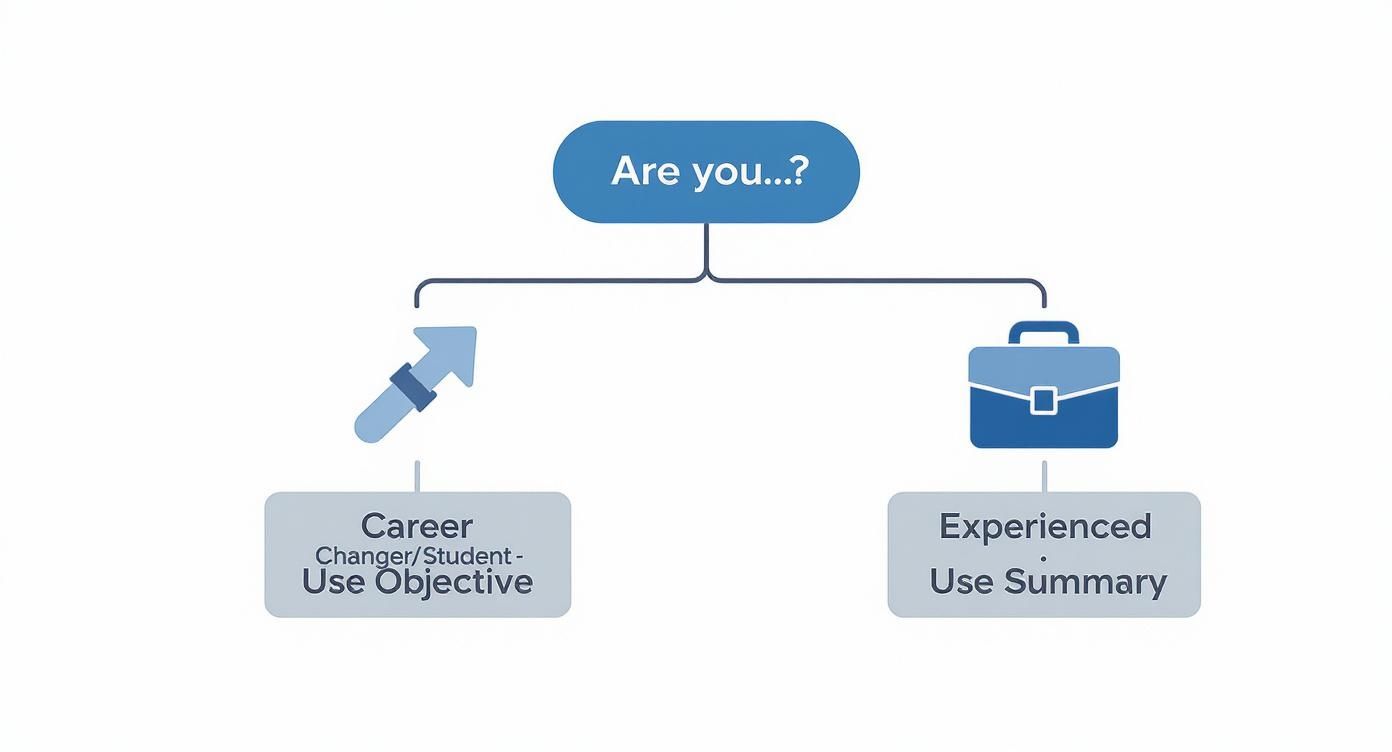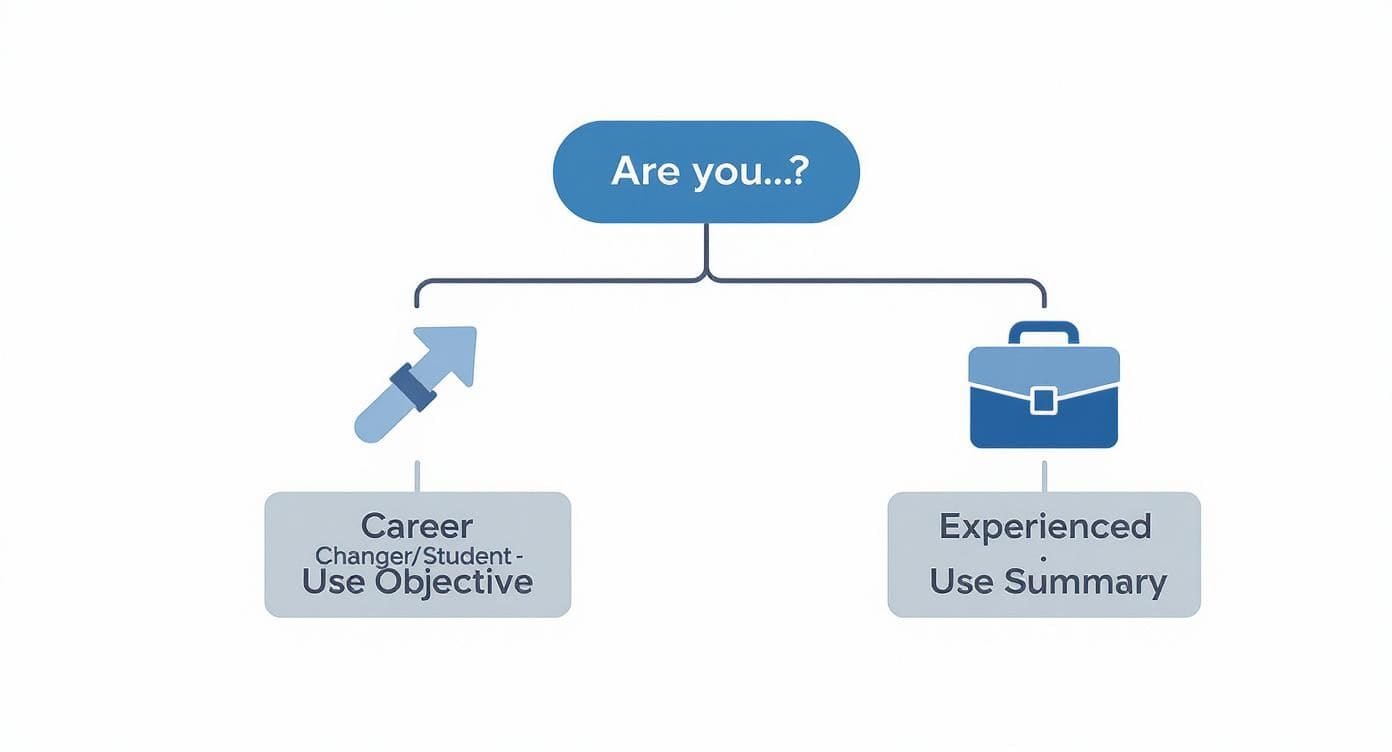How to Write a Powerful Resume Objective
Is a resume objective still relevant? Find out when to use one, how to write a powerful resume objective, and see examples that land interviews.

How to Write a Powerful Resume Objective
A resume objective is a short, targeted statement at the top of your resume that states your career goals and the specific job you are seeking. While a professional summary is more common today, a well-written objective can be a game-changer in specific situations, such as when you're changing careers or have limited work experience. This guide will show you exactly when to use a resume objective and how to write one that gets the hiring manager's attention, helping you land more interviews.
Is a Resume Objective Still Relevant Today?
For most job seekers with a solid track record, the professional summary has taken its place as the modern standard. Why the shift? A summary jumps right into the value you bring to the table, while an objective talks about what you want. Think of it this way: a summary is like a movie trailer showing off all the best action scenes (your achievements). An objective, on the other hand, is like telling someone the plot you hope unfolds (your goals). Most recruiters want to see the trailer.
But it would be a mistake to write off the objective entirely. It remains a surprisingly effective tool for a specific slice of the job market. This includes recent grads with limited experience, people making a major career pivot, or anyone targeting a super-specific role where showing clear, focused intent is a major plus. The trick is knowing when it's better to state what you want versus showing what you've already done.
The Modern Hiring Reality
The data tells a pretty clear story here. Resumes that kick off with a professional summary tend to get about 340% more interview callbacks than those that start with a traditional objective.
That's a huge difference, and it comes down to how people hire today. Hiring managers spend just six or seven seconds on that first glance, and they're looking for immediate, employer-focused value—not your personal career wish list. Vague objectives just don't communicate problem-solving skills, and they fall flat against modern Applicant Tracking Systems (ATS) that are programmed to find relevant skills and measurable impact.
Not sure which one is right for you? This decision tree should clear things up in a hurry.

As you can see, the right choice really boils down to where you are in your career and what you're trying to accomplish with your application.
Resume Objective vs Professional Summary at a Glance
To make the choice even clearer, let's put these two opening statements side-by-side. Nailing this part is a key step in choosing a modern format for your resume that tells the right story.
| Feature | Resume Objective | Professional Summary |
|---|---|---|
| Primary Focus | Your career goals and the specific position you want. | Your key accomplishments and the value you offer. |
| Best For | Career changers, recent graduates, entry-level candidates. | Experienced professionals with a clear work history. |
| Tone | Aspirational and forward-looking ("I want to..."). | Accomplishment-oriented and evidence-based ("I have..."). |
| Impact | Explains why you are applying and clarifies your intent. | Proves why you are qualified with past results. |
Ultimately, both are tools. Your job is to pick the right one for the task at hand. If you need to connect the dots for the recruiter, an objective can be your best friend. But if your experience speaks for itself, a summary will let it shout from the rooftops.
Get Your Free Resume Review
Upload your resume and get instant AI suggestions to improve your chances
When You Should Still Use a Resume Objective
While the professional summary has become the go-to for most job seekers, think of the resume objective as a specialist tool. It's not for every job, but in the right situations, it's the best way to frame your application and guide the recruiter's perspective. It's your chance to connect the dots when your work history alone doesn't tell the full story.
A sharp, well-written objective acts like a spotlight, drawing immediate attention to your potential and making your intentions crystal clear. This is most powerful for three specific groups who need to bridge a gap between their past and their desired future.
For Career Changers
When you're pivoting to a new industry, your past experience might look totally unrelated at first glance. A resume objective is the perfect tool to build that bridge for the hiring manager.
It gives you a space, right at the top, to explain your career transition and highlight the transferable skills that make you a strong candidate—even without direct experience. For instance, a teacher moving into corporate training can use an objective to flag their expertise in curriculum development, public speaking, and adult learning. This stops recruiters from making the wrong assumptions about your background.
For Recent Graduates and Entry-Level Candidates
If you're just starting out, your professional experience section might be a little thin. That's okay. A resume objective helps fill this space by shifting the focus from a lack of job history to an abundance of passion, relevant academic knowledge, and a clear career direction.
It shows hiring managers you're not just blasting out applications to any open job. You're intentionally targeting their role and their industry.
This focused approach helps overcome the lack of extensive experience by clearly aligning an applicant's ambitions with the employer's needs. For those building a resume with no experience, an objective can be a powerful way to communicate drive and relevant coursework.
For Targeting a Highly Specific Role
Sometimes, you're not just looking for any job in your field; you're gunning for one specific, niche position at a particular company. In this scenario, a generic summary just won't cut it.
A highly tailored resume objective signals a deep and genuine interest that goes way beyond a casual application. It proves you've done your research, you understand their unique needs, and you're genuinely passionate about contributing to their specific mission. This level of customization can make your application pop in a sea of more generalized resumes.
Even with the modern preference for summaries, experts confirm that a concise, tailored objective remains a critical tool for job seekers in these situations. You can discover more insights about when to use a resume objective on The Interview Guys' blog.
How to Write an Objective That Gets Noticed

Crafting a killer resume objective doesn't need to be a huge headache. The trick is to stop thinking of it as a generic intro and start treating it like a targeted pitch—a single sentence so specific it couldn't possibly be used for any other job application.
By following a simple four-part framework, you can cut through the usual fluff and speak directly to what the hiring manager actually cares about. This approach not only makes your objective more impactful but also helps it get past those pesky Applicant Tracking Systems (ATS).
The Four-Part Formula for a Winning Objective
Think of building your objective like assembling a puzzle. Each of these four pieces adds a layer of crucial detail, snapping together to create a complete picture that grabs attention.
Start with a Powerful Trait: Kick things off with a strong adjective or a core skill that defines you professionally. Think words like "Detail-oriented," "Motivated," or "Creative." This is your hook.
State Your Experience Level: Immediately tell them who you are in your career journey. Are you a "Recent Finance Graduate," an "Experienced Project Manager," or a "Certified Nursing Assistant"? No guesswork needed.
Name the Position and Company: This is the most important step for customization, and it's non-negotiable. Always call out the specific job title and the company you're applying to, like "...seeking a Junior Graphic Designer role at Innovate Inc."
Articulate Your Value: End by clearly stating what you bring to their table. Frame it around how you'll help them hit their goals, not what you want from them. This shows you've done your homework.
Sticking to this structure helps you build a compelling and unique resume objective every single time. It's a formula that delivers a truly personalized result.
Putting It All Together
So, what does this look like in the real world? When you combine these four elements, you get a short, powerful statement that does some serious heavy lifting.
Example: "Motivated and detail-oriented recent finance graduate seeking to apply strong analytical skills and academic knowledge to the Financial Analyst position at Crestwood Corp. Eager to contribute to data-driven decision-making and support the company's growth objectives."
See how that works? It starts with traits, defines the candidate's status, names the exact role and company, and closes with the value they'll deliver. This tailored approach is what makes an objective one of the most effective parts of a resume. For a deeper look at how to structure the rest of your document, our complete resume writing guide has you covered.
Just as a sharp objective helps you stand out in a stack of applications, understanding effective strategies for a powerful online presence is essential for career growth today. Both are about making a strong, intentional first impression that opens doors.
Common Resume Objective Mistakes to Avoid
A poorly written resume objective can do more harm than good. In fact, a bad one can stop your application dead in its tracks. While it's tempting to focus only on what to write, knowing what not to do is just as critical. Let's walk through the common pitfalls that can sink your chances before a recruiter even gets to your experience section.
The single most common mistake is being painfully generic. A statement like, "Seeking a challenging role where I can utilize my skills," is a massive red flag for hiring managers. It screams that you're just blasting the same resume out to dozens of companies without putting any real thought into this specific opportunity. It's a complete waste of valuable resume real estate.
Another killer error is making the objective all about you and what you want. Think of it this way: your objective should be a two-way street, with a heavy emphasis on the value you're bringing to them.
Bad Example: "Recent graduate seeking an entry-level position to gain experience and grow my career."
This is a classic "me-focused" statement. It tells the company nothing about how you can solve their problems and instead frames the job as a stepping stone for your own benefit. It's self-centered and totally ineffective.
Keeping It Concise and Professional
Your objective isn't the place for your life story. It should be a short, powerful pitch—stick to two or three sentences, max. Anything longer turns into a dense block of text that a busy hiring manager will almost certainly skip right over. Be punchy. Be direct.
And this should go without saying, but typos and grammatical errors are the kiss of death. This tiny section is the very first impression a recruiter has of you. A mistake here instantly signals a lack of attention to detail, a trait that's valued in pretty much every job on the planet. Proofread it. Then read it aloud. Then have someone else proofread it. This level of detail is also crucial for getting your resume past the automated screening software many companies use. You can learn more in our complete guide to building an ATS-friendly resume.
Passive vs. Active Language
The language you choose matters immensely. Using passive phrasing drains the energy and confidence from your statement. Instead of saying you are "seeking an opportunity," you need to take an active stance that puts your skills and intentions front and center.
- Weak (Passive): "A position is being sought where my communication skills can be utilized."
- Strong (Active): "Seeking to apply proven communication and client management skills to the Customer Success role at Innovate Inc."
See the difference? The active version is direct, confident, and tailored to a specific role at a specific company. By steering clear of these common blunders, your resume objective goes from being a potential liability to a compelling hook that makes a recruiter want to keep reading.
Winning Resume Objective Examples

Theory is one thing, but seeing a powerful resume objective in action is what really makes the concept click. The quickest way to get a feel for the formula is to see how it bends and adapts to different career stages and industries.
Let's break down some real-world examples. Each one is built to grab a recruiter's attention by being direct, value-focused, and laser-focused on the specific job. Notice how they all hit the same core principles: they name the role and company, highlight a key strength, and pivot immediately to the value they'll deliver.
Examples for Career Changers
Pivoting to a new career is probably the single best time to use a resume objective. Your whole goal is to connect the dots for the hiring manager, showing them exactly how your seemingly unrelated experience is a perfect fit for this new field.
- From Retail to Tech Sales: "Detail-oriented retail manager with 5+ years of experience in client relations and team leadership, now transitioning into the tech industry. Eager to apply proven sales and customer satisfaction skills to the SaaS Account Executive position at Connectly, where I can drive revenue growth and build lasting client partnerships."
- From Hospitality to Human Resources: "Empathetic and organized hospitality professional with 8 years of experience in team management and conflict resolution. Seeking to leverage strong interpersonal and problem-solving skills in the Human Resources Coordinator role at Innovate Solutions to help foster a positive and productive workplace culture."
These work because they don't try to hide the career change. They lean into it, reframing past experience as a unique strength packed with transferable skills.
Examples for Recent Graduates
When you're just stepping into the workforce, a resume objective does a different job. It shifts the focus away from a light work history and puts the spotlight on your academic drive, genuine passion, and untapped potential. It sends a clear signal that you're not just blasting out applications—you're targeting this specific opportunity for a reason.
Pro-Tip: "Motivated and analytical recent Finance graduate from State University looking to apply strong quantitative analysis and financial modelling skills to the Junior Financial Analyst position at Capital Investments. I am eager to contribute to data-driven insights and support the firm's strategic financial planning."
This one is solid. It names specific, valuable skills (quantitative analysis, financial modelling), calls out the target company, and states exactly how the candidate intends to contribute from day one. For more ideas, you can check out a wide variety of other powerful resume examples on our blog.
Industry-Specific Examples
Of course, you have to tailor your objective to the industry you're targeting. The language and skills you'd highlight for a marketing gig are completely different from what you'd use for a healthcare position.
- Marketing: "Creative and results-oriented marketing professional with 3 years of experience in digital campaign management. Seeking to join the team at Spark Agency as a Social Media Specialist to increase brand engagement and drive conversions through data-informed content strategies."
- Healthcare: "Compassionate and certified nursing assistant with experience in fast-paced clinical environments. Aiming to leverage patient care and charting skills in the Medical Assistant role at Crestwood Health to ensure excellent patient outcomes and support the clinical staff."
This level of customization shows you've done your homework and have a real interest in the role's specific demands. It makes your application feel personal and far more compelling than a generic, copy-pasted statement.
Answering Your Questions About Resume Objectives
Alright, let's clear up some of the common questions and grey areas around resume objectives. While resumes have definitely changed over the years, a sharp, well-written objective can still be a seriously powerful tool. This is where we tackle the practical, "should I or shouldn't I" questions to help you finalize your resume with confidence.
Think of this as reinforcing the core ideas we've covered, so you can make the right strategic call for your next job application.
How Long Should a Resume Objective Be?
Brevity is your best friend here. A resume objective needs to be a short, powerful pitch—not a meandering paragraph. You should aim for a maximum of two to three sentences. That's it.
Anything longer risks getting skipped entirely by a hiring manager who's probably spending just a few seconds on their first scan of your resume. The whole point is to be concise and impactful, getting your core message across without any fluff. Treat it like a headline for your career story, designed to hook the reader and make them want to learn more.
Should I Use an Objective If I Am Also Writing a Cover Letter?
This is a great question, and it comes up all the time. The short answer is yes, you absolutely can—and often should—use both. While they seem to serve a similar purpose, they function in completely different ways.
A cover letter is your chance to tell a story, connecting the dots between your experience and your motivation. A resume objective, on the other hand, is a high-level snapshot built for the quick-scan environment of the resume itself. It makes sure your primary goal is seen immediately, even if the recruiter doesn't open the cover letter right away.
Think of them as complementary tools working together:
- Resume Objective: Your 10-second elevator pitch.
- Cover Letter: Your 3-minute, in-depth conversation.
They team up to present a cohesive and compelling case to the hiring manager. Using both ensures you're communicating your intent clearly, whether the recruiter has five seconds or five minutes.
Can I Use the Same Objective for Every Job Application?
In a word: no. This is one of the most critical mistakes you can make in a job search. A generic, copy-pasted objective is painfully obvious to recruiters and immediately signals that you aren't genuinely interested in this specific role.
Each resume objective must be tailored to the specific job and company. That means you should be mentioning the exact job title and the company's name, whilst aligning your skills and goals with the key requirements you pulled from the job description. Customising it shows you've done your homework and are thoughtfully applying for this opportunity, not just blasting your resume out to anyone and everyone.
What Is the Difference Between a Career Objective and a Resume Objective?
Honestly, for all practical purposes, there isn't one. The terms "career objective" and "resume objective" are used interchangeably these days. Both refer to that short, introductory statement at the top of a resume that spells out your professional goals and targets a specific position.
If you want to get historical, "career objective" might have once suggested a broader, long-term vision. But in modern resume writing, the focus is squarely on the immediate goal: landing the job you're applying for. So, whether you label it a "career objective" or a "resume objective," the recipe for success is exactly the same: keep it short, tailor it to the job, and focus on the value you can deliver.
Ready to build a resume that gets noticed? The Smart CV Builder from CV Anywhere uses AI to create polished, ATS-friendly resumes with perfectly aligned summaries and skills. Unify your entire job search and move from CV to job offer faster with CV Anywhere.
Tags
Related Articles
How to Include Internship in Resume: A 2026 US Guide
Knowing how to include internship in resume documents is crucial for standing out in the 2026 US job market. The most effective strategy is to list your internship within your 'Professional Experience...
Read more →Top 10 Strengths to Put on a Resume for the 2026 US Job Market
The best strengths to put on a resume in 2026 for the US job market include a strategic mix of technical expertise (like data analysis and software proficiency), leadership capabilities (such as proje...
Read more →How to Effectively List Self Employment on Resume
How to Effectively List Self Employment on Resume Listing your self-employment on a resume isn't a red flag—far from it. When you frame it correctly, it's a powerful asset that screams initiative, res...
Read more →Popular Articles
Finding the right cv template google docs can be a great starting point for your job search, but it's often not the most effective path to getting hired. Whilst templates offer a visual framework, the...
The best way to craft a comprehensive and professional CV of curriculum vitae is with a dedicated tool like CV Anywhere's CV builder. It ensures your document is perfectly formatted and optimised to h...
Stop searching for the perfect template of resume. Trawling through hundreds of options to find one that fits your experience is an outdated, frustrating process. The solution isn't a better template;...
Here is a detailed breakdown of the 12 best options for a resume maker for free available today. We've done the research for you, so you can stop searching and start building a professional, job-winni...
Picking the right resume templates is your first—and most important—move in getting a recruiter's attention. It's not just about looks; a great template is a strategic tool. It organizes your career s...